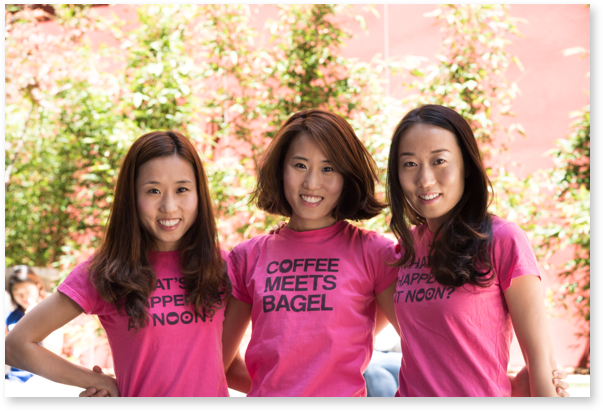
It seems like Seattle is home to more and more tech companies by the day — and today is no different.
GeekWire has learned that San Francisco-based startup Coffee Meets Bagel, which rose to fame after its founders turned down a $30 million deal from investor Mark Cuban on Shark Tank, is opening a new Seattle office. The office is the company’s first location outside the Bay Area and will house five employees when it opens Jan. 2.
Coffee Meets Bagel Co-founder and Co-CEO Arum Kang told GeekWire the office grew organically out of the startup’s decision to hire new employees based on talent, not location. The company has hired individual employees in cities scattered across the U.S., but in Seattle, it attracted three new hires fairly quickly.

“This is why, specifically for Seattle, we decided to double-down more,” Kang said, also calling out the wealth of talent from big employers like Microsoft and Amazon. The office will be in the Westlake WeWork in Seattle for the time being and Kang said she expects it to grow, potentially opening a full office in the coming years.
Coffee Meets Bagel is a dating app, and Kang said its secret sauce is how it curates the dating experience. Its approach grew out of research she did while getting her MBA at Harvard — she studied how people make connections over social networks, specifically in the dating realm, and she found some interesting patterns.
The most obvious was the number of users, and particularly engaged users, on dating services: The vast majority are men.
“Our unique insight was: there is a huge problem with online dating platforms in that the average gender ratio is totally lopsided. It’s 65 to 35 male to female ratio. And that’s just users — if you look at engaged users, because men tend to be almost twice as likely to be active than women, it’s even more extreme,” she said. The numbers showed that creating a good user experience for women was a must for a new dating service.
Coffee Meets Bagel was founded a few months later by the Kang sisters: Arum, her twin sister Dawoon and their older sister Soo. Arum and Dawoon are now co-CEOs of the company, which employs 35 and has raised $8 million to date.
The founders thought, “If we can attract and retain women, we can essentially enhance the experience for both genders,” Kang said.
To accomplish that goal, they created a new kind of platform that tailors the dating experience depending on a user’s gender and sexual orientation. Kang explained that women tend to prefer to have matches curated for them instead of sifting through lots of profiles and that men prefer the opposite, according to research on the industry.
To try to satisfy everyone, Coffee Meets Bagel sends up to six curated matches to women on the platform each day and up to 21 curated matches to men. Those numbers are tweaked slightly for LGBT users who may are interested in partners of the same sex. And in heterosexual matches, women must make the first move to start an interaction.
The online dating space is crowded, to say the least. Coffee Meets Bagel is up against established players, like Match.com and eHarmony as well as new arrivals like Tinder and Bumble.
Kang says the goal of Coffee Meets Bagel is far different from offerings like Tinde because they are catering to different connections — Tindr is aimed at a fun, immediate interaction while Coffee Meets Bagel wants to be the go-to resource for creating long-term relationships.
That leaves the company up against established players like Match.com and, of course, the way most people prefer to meet a partner: In person.
“We also look at the offline experience as our biggest competitor,” Kang said.
The challenge is the negative perception of online dating that far precedes the app and its compatriots. Single people, even millennials, say the still prefer to meet people offline rather than try to find a partner through a network or app.
Kang says that negative reputation is justified, because it’s clear online dating isn’t currently giving users an experience that they enjoy and want to see.
“There’s no shortcut way to remedy that, it’s really that we need to deliver,” Kang says. “I think the future of online dating is getting connected on the platform,” Kang says.
Kang is so optimistic, she envisions a time when people will get to know each other and even have their first few dates in a dating app or another online platform.
So was it worth turning down the $30 million offer from Cuban?
“Oh my god yes,” Kang said. “We are worth way, way, way more than that at this point.”
“We’re looking at a 100-year horizon here, I’m not here to build a five, ten-year company,” she said.





